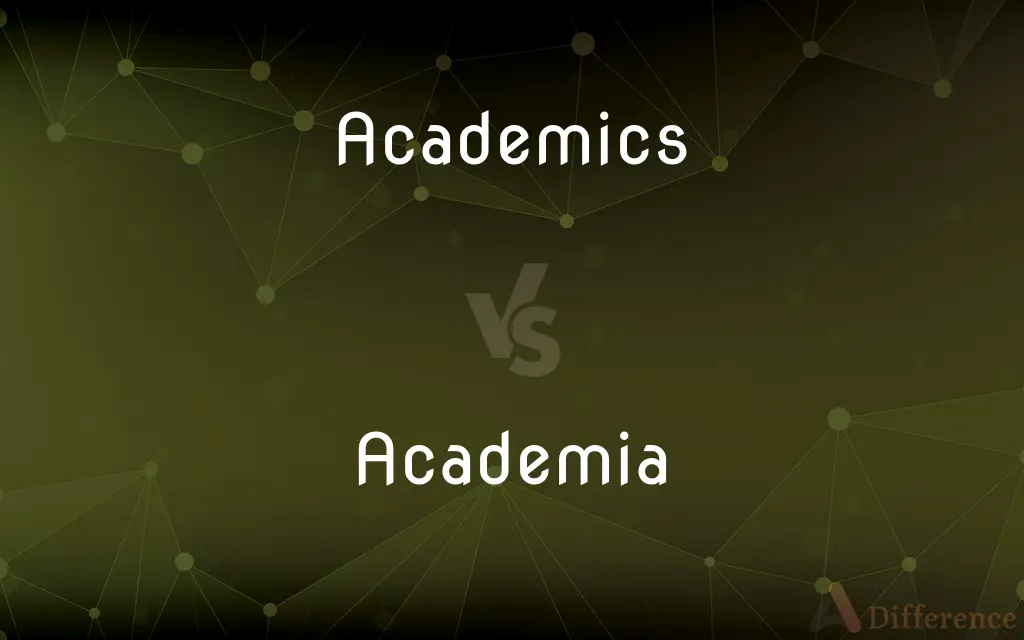Academics vs. Academia — What's the Difference?
By Urooj Arif & Fiza Rafique — Updated on April 2, 2024
Academics focuses on scholarly pursuits and education, while Academia is the institutional structure encompassing these activities.

Difference Between Academics and Academia
Table of Contents
ADVERTISEMENT
Key Differences
Academics refers to the aspects related to scholarly activities, subjects, and education, emphasizing the process of learning and teaching within various disciplines. It is primarily concerned with the content and methodologies of education, focusing on the development and dissemination of knowledge across fields such as mathematics, science, humanities, and more. Whereas, Academia is the broader ecosystem that includes not only the academic pursuits themselves but also the institutions, communities, and cultural norms that support and regulate the practice of teaching and research. Academia encompasses universities, colleges, research institutes, and the organizational and administrative frameworks that govern them.
While academics often focus on the individual or collective efforts of scholars and educators to explore, understand, and teach various subjects, academia provides the structured environment in which these activities take place. Academics is more about the intellectual or educational content, and academia is about the institutions that house and facilitate that content's exploration and delivery.
Academics is also characterized by the pursuit of knowledge and the advancement of educational goals, involving research, study, and the application of theoretical concepts. On the other hand, academia not only includes these pursuits but also involves the politics, policies, and social dynamics within educational institutions that affect how education and research are conducted.
The distinction between academics and academia can also be seen in their contributions to society. Academics contribute through the creation and dissemination of knowledge, the development of new ideas, and the education of individuals. Whereas, academia's contribution includes not only these academic outputs but also the creation of a skilled workforce, the promotion of cultural and societal norms through education, and the provision of a space for critical discourse and innovation.
The individuals involved in academics and academia can differ. Academics typically refer to the educators, researchers, and students engaged in the study and exploration of scholarly topics. In contrast, academia includes these individuals but also encompasses administrative staff, policy-makers, and others involved in the support and governance of educational institutions.
ADVERTISEMENT
Comparison Chart
Definition
Refers to scholarly activities, subjects, and education.
The institutional structure supporting scholarly activities.
Focus
On the content and methodology of education and research.
On the institutions, communities, and norms in education.
Main Contributors
Educators, researchers, and students.
Includes educators, administrators, and policy-makers.
Contribution
Creation and dissemination of knowledge.
Provides structure and governance for education and research.
Scope
Individual or collective scholarly efforts.
Broader ecosystem including institutions and regulations.
Compare with Definitions
Academics
The subjects and knowledge taught in educational institutions.
The curriculum includes academics such as mathematics and history.
Academia
The values and expectations that guide behavior in educational institutions.
Academic integrity is a fundamental principle in academia.
Academics
Activities related to learning and researching within various disciplines.
Conducting experiments in a laboratory is a common academic activity in the sciences.
Academia
The organizations and institutions that support scholarly activities.
Universities are a key part of academia, providing resources for research and education.
Academics
The process of investigating and exploring subjects to gain new insights.
Her academics involve extensive research in medieval literature.
Academia
Groups of scholars and educators who share interests and collaborate.
The academic conference gathered professionals from across academia to discuss environmental science.
Academics
Ideas and theories that form the basis of academic disciplines.
Theoretical physics offers challenging academics for students.
Academia
The regulations and administrative decisions that affect education and research.
Policies on research funding are a critical issue in academia.
Academics
Objectives related to the advancement of knowledge and learning.
Achieving a higher degree is a common goal in academics.
Academia
The administrative and organizational support for educational activities.
The university's administration plays a crucial role in the governance of academia.
Academics
College or university courses and studies
"Academics are a much more important priority to him than athletics" (Gerald McIntosh).
Academia
The environment or community concerned with the pursuit of research, education, and scholarship
He spent his working life in academia
Academics
Plural of academic
Academia
The academic community; academe.
Academics
Academia.
Academia
(collective) The scientific and cultural community engaged in higher education and research, taken as a whole.
Academia continues to provide scientific education, despite attempts to turn it into a system of professional schooling.
Academia
Continuous study at higher education institutions; scholarship.
Not every university graduate wishes to pursue academia.
Academia
The academic world
Common Curiosities
What roles do universities play in academia?
Universities are central to academia, providing the infrastructure, resources, and community for teaching and research.
How does academia differ from academics?
Academia refers to the broader institutional and community framework that supports and regulates academic pursuits.
Can someone be part of academia but not actively engaged in academics?
Yes, individuals like administrators and policy-makers are part of academia without being directly involved in scholarly teaching or research.
Is research considered a part of academics or academia?
Research is a part of academics, focusing on the pursuit of knowledge, and it takes place within the framework of academia.
What is the role of students in academics?
Students are key participants in academics, engaging in learning, research, and the application of knowledge.
What is the importance of policies in academia?
Policies in academia govern the conduct of research, teaching, and the overall operation of educational institutions.
Can academics exist outside of academia?
While academics primarily occurs within educational institutions, independent scholars can also pursue academic activities outside traditional academia.
How do academic communities contribute to academia?
Academic communities foster collaboration, innovation, and the sharing of knowledge within academia.
How does academia impact society?
Academia contributes to society by educating individuals, advancing knowledge, and promoting cultural and societal norms.
What is the main focus of academics?
Academics focuses on the scholarly activities, subjects, and education within various disciplines.
How do cultural norms influence academia?
Cultural norms within academia influence behaviors, ethical standards, and expectations in educational and research activities.
What challenges face academia today?
Challenges include funding constraints, ethical issues in research, and the need for inclusivity and diversity in educational institutions.
What is the significance of academic goals?
Academic goals drive the pursuit of knowledge, personal development, and the advancement of society through education and research.
What distinguishes academic content from other types of content?
Academic content is characterized by its scholarly nature, emphasis on research, and contribution to knowledge in specific fields.
How do theoretical concepts play a role in academics?
Theoretical concepts form the foundation for academic disciplines, guiding research and the development of new knowledge.
Share Your Discovery

Previous Comparison
Battery vs. Pile
Next Comparison
Digitalize vs. DigitaliseAuthor Spotlight
Written by
Urooj ArifUrooj is a skilled content writer at Ask Difference, known for her exceptional ability to simplify complex topics into engaging and informative content. With a passion for research and a flair for clear, concise writing, she consistently delivers articles that resonate with our diverse audience.
Co-written by
Fiza RafiqueFiza Rafique is a skilled content writer at AskDifference.com, where she meticulously refines and enhances written pieces. Drawing from her vast editorial expertise, Fiza ensures clarity, accuracy, and precision in every article. Passionate about language, she continually seeks to elevate the quality of content for readers worldwide.















































